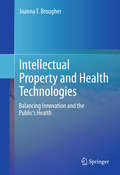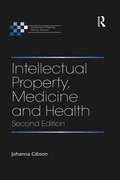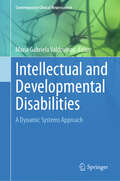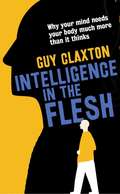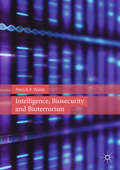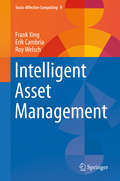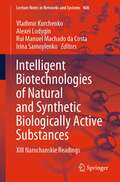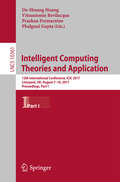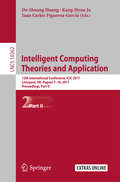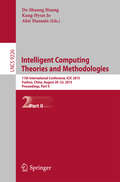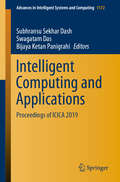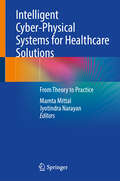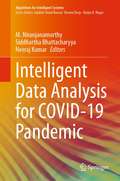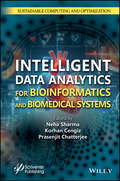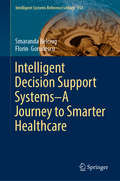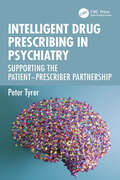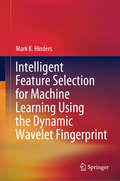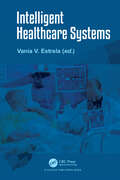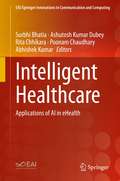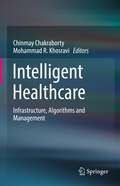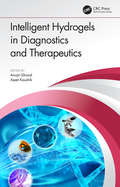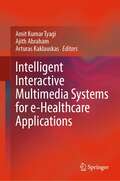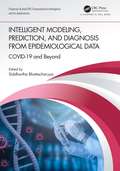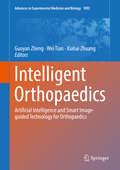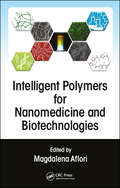- Table View
- List View
Intellectual Property and Health Technologies
by Joanna T. BrougherIntellectual Property and Health Technologies Balancing Innovation and the Public's Health Joanna T. Brougher, Esq. , MPH At first glance, ownership of intellectual property seems straightforward: the control over an invention or idea. But with the recent explosion of new scientific discoveries poised to transform public health and healthcare systems, costly and lengthy patent disputes threaten both to undermine the attempts to develop new medical technologies and to keep potentially life-saving treatments from patients who need them. Intellectual Property and Health Technologies grounds readers in patent law and explores how scientific research and enterprise are evolving in response. Geared specifically to the medical disciplines, it differentiates among forms of legal protection for inventors such as copyrights and patents, explains their limits, and argues for balance between competing forces of exclusivity and availability. Chapters delve into the major legal controversies concerning medical and biotechnologies in terms of pricing, markets, and especially the tension between innovation and access, including: The patent-eligibility of genes The patent-eligibility of medical process patents The rights and roles of universities and inventors The balancing of access, innovation, and profit in drug development The tension between biologics, small-molecule drugs, and their generic counterparts International patent law and access to medicine in the developing world As these issues continue to shape and define the debate, Intellectual Property and Health Technologies enables professionals and graduate students in public health, health policy, healthcare administration, and medicine to understand patent law and how it affects the development of medical technology and the delivery of medicine.
Intellectual Property, Medicine and Health: Current Debates (Intellectual Property, Theory, Culture Ser.)
by Johanna GibsonIntellectual Property, Medicine and Health examines critical issues and debates, including access to knowledge and medicinal products, human rights and development, innovations in life technologies and the possibility for ethical frameworks for intellectual property law and its application in public health. The second edition accounts for recent and in some areas extensive developments in this dynamic and fast-moving field. This edition brings together new and updated examples and analysis in competition and regulation, gene-related inventions and biotechnology, as well as significant cases, including Novartis v Union of India.
Intellectual and Developmental Disabilities: A Dynamic Systems Approach (Contemporary Clinical Neuroscience)
by Maria Gabriela ValdovinosThis new reference provides a comprehensive overview of intellectual and developmental disabilities, incorporating multiple perspectives and disciplines (including developmental neuroscience, genetics, psychiatry, and psychology) with a multifaceted approach, offering readers appreciation for the richness of the population and field. It provides readers with an understanding of the developmental, biological, and behavioral aspects of developmental disabilities with the aim of understanding their causes, the differences between disabilities, and familiarity with the prognosis and developmental outcomes for children diagnosed with various developmental disabilities.
Intelligence in the Flesh
by Guy ClaxtonIf you think that intelligence emanates from the mind and that reasoning necessitates the suppression of emotion, you'd better think again--or rather not "think" at all. In his provocative new book, Guy Claxton draws on the latest findings in neuroscience and psychology to reveal how our bodies--long dismissed as mere conveyances--actually constitute the core of our intelligent life. From the endocrinal means by which our organs communicate to the instantaneous decision-making prompted by external phenomena, our bodies are able to perform intelligent computations that we either overlook or wrongly attribute to our brains. Embodied intelligence is one of the most exciting areas in contemporary philosophy and neuropsychology, and Claxton shows how the privilege given to cerebral thinking has taken a toll on modern society, resulting in too much screen time, the diminishment of skilled craftsmanship, and an overvaluing of white-collar over blue-collar labor. Discussing techniques that will help us reconnect with our bodies, Claxton shows how an appreciation of the body's intelligence will enrich all our lives.
Intelligence, Biosecurity and Bioterrorism
by Patrick F. WalshThis book explores how potential bio-threats and risks may evolve post 9/11 given the rapid changes in biotechnology and synthetic biology. It also explores what role intelligence communities can play in understanding threats and risks. It argues that although bio-threats and risks are largely low probability and high impact in nature, intelligence in ‘Five Eyes’ countries remain insufficiently prepared to understand them. This book identifies key areas where intelligence reforms need to take place including a more strategic and systematic collaboration between national security/law enforcement intelligence and the scientific community. It is aimed at intelligence analysts, those in the scientific community working on health security threats, policy makers and researchers working on biosecurity and bioterrorism threats and risks.
Intelligent Asset Management (Socio-Affective Computing #9)
by Erik Cambria Frank Xing Roy WelschThis book presents a systematic application of recent advances in artificial intelligence (AI) to the problem of asset management. While natural language processing and text mining techniques, such as semantic representation, sentiment analysis, entity extraction, commonsense reasoning, and fact checking have been evolving for decades, finance theories have not yet fully considered and adapted to these ideas.In this unique, readable volume, the authors discuss integrating textual knowledge and market sentiment step-by-step, offering readers new insights into the most popular portfolio optimization theories: the Markowitz model and the Black-Litterman model. The authors also provide valuable visions of how AI technology-based infrastructures could cut the cost of and automate wealth management procedures.This inspiring book is a must-read for researchers and bankers interested in cutting-edge AI applications in finance.
Intelligent Biotechnologies of Natural and Synthetic Biologically Active Substances: XIII Narochanskie Readings (Lecture Notes in Networks and Systems #408)
by Vladimir Kurchenko Alexei Lodygin Rui Manuel Machado da Costa Irina SamoylenkoThis book contains articles on innovative biotechnologies for the production and application of biopolymers and their derivatives in various industries. The conference “Intelligent Biotechnologies of Natural and Synthetic Biologically Active Substances: XIII Narochanskie Readings” took place on the base of Belarussian State University (Republic of Belarus, Minsk) and North Caucasus Federal University (Russian Federation, Stavropol) on December 1–3, 2021.The general scope of the book is current issues of biologically active substances (BAS) recovery and preparation methods development and their application in medicine, pharmaceutics, and functional nutrition.A number of original articles are devoted to the actual problems of BAS obtaining and application. A significant part of articles is related to the production of BAS nanocomplexes.Much attention is paid to promising areas of healthy foods biotechnology development and food safety. The book intends to readership specializing in the field of searching for new sources of BAS for their practical use in the framework of innovative pharmaceuticals and functional foods development
Intelligent Computing Theories and Application
by Phalguni Gupta Prashan Premaratne De-Shuang Huang Vitoantonio BevilacquaThe International Conference on Intelligent Computing (ICIC) was formed to provide an annual forum dedicated to the emerging and challenging topics in artificial intel- gence, machine learning, pattern recognition, image processing, bioinformatics, and computational biology. It aims to bring together researchers and practitioners from both academia and industry to share ideas, problems, and solutions related to the m- tifaceted aspects of intelligent computing. ICIC 2010, held in Changsha, China, August 18-21, 2010, constituted the 6th - ternational Conference on Intelligent Computing. It built upon the success of ICIC 2009, ICIC 2008, ICIC 2007, ICIC 2006, and ICIC 2005, that were held in Ulsan, Korea, Shanghai, Qingdao, Kunming and Hefei, China, respectively. This year, the conference concentrated mainly on the theories and methodologies as well as the emerging applications of intelligent computing. Its aim was to unify the picture of contemporary intelligent computing techniques as an integral concept that highlights the trends in advanced computational intelligence and bridges theoretical research with applications. Therefore, the theme for this conference was "Advanced Intelligent Computing Technology and Applications. " Papers focusing on this theme were solicited, addressing theories, methodologies, and applications in science and technology.
Intelligent Computing Theories and Application
by De-Shuang Huang Kang-Hyun Jo Juan Carlos Figueroa-GarcíaThe International Conference on Intelligent Computing (ICIC) was formed to provide an annual forum dedicated to the emerging and challenging topics in artificial intel- gence, machine learning, pattern recognition, image processing, bioinformatics, and computational biology. It aims to bring together researchers and practitioners from both academia and industry to share ideas, problems, and solutions related to the m- tifaceted aspects of intelligent computing. ICIC 2010, held in Changsha, China, August 18-21, 2010, constituted the 6th - ternational Conference on Intelligent Computing. It built upon the success of ICIC 2009, ICIC 2008, ICIC 2007, ICIC 2006, and ICIC 2005, that were held in Ulsan, Korea, Shanghai, Qingdao, Kunming and Hefei, China, respectively. This year, the conference concentrated mainly on the theories and methodologies as well as the emerging applications of intelligent computing. Its aim was to unify the picture of contemporary intelligent computing techniques as an integral concept that highlights the trends in advanced computational intelligence and bridges theoretical research with applications. Therefore, the theme for this conference was "Advanced Intelligent Computing Technology and Applications. " Papers focusing on this theme were solicited, addressing theories, methodologies, and applications in science and technology.
Intelligent Computing Theories and Methodologies
by De-Shuang Huang Kang-Hyun Jo Abir HussainThis two-volume set LNCS 9225 and LNCS 9226 constitutes - in conjunction with the volume LNAI 9227 - the refereed proceedings of the 11th International Conference on Intelligent Computing, ICIC 2015, held in Fuzhou, China, in August 2015. The total of 191 full and 42 short papers presented in the three ICIC 2015 volumes was carefully reviewed and selected from 671 submissions. The papers are organized in topical sections such as evolutionary computation and learning; compressed sensing, sparse coding and social computing; neural networks, nature inspired computing and optimization; pattern recognition and signal processing; image processing; biomedical informatics theory and methods; differential evolution, particle swarm optimization and niche technology; intelligent computing and knowledge discovery and data mining; soft computing and machine learning; computational biology, protein structure and function prediction; genetic algorithms; artificial bee colony algorithms; swarm intelligence and optimization; social computing; information security; virtual reality and human-computer interaction; healthcare informatics theory and methods; unsupervised learning; collective intelligence; intelligent computing in robotics; intelligent computing in communication networks; intelligent control and automation; intelligent data analysis and prediction; gene expression array analysis; gene regulation modeling and analysis; protein-protein interaction prediction; biology inspired computing and optimization; analysis and visualization of large biological data sets; motif detection; biomarker discovery; modeling; simulation; and optimization of biological systems; biomedical data modeling and mining; intelligent computing in biomedical signal/image analysis; intelligent computing in brain imaging; neuroinformatics; cheminformatics; intelligent computing in computational biology; computational genomics; special session on biomedical data integration and mining in the era of big data; special session on big data analytics; special session on artificial intelligence for ambient assisted living; and special session on swarm intelligence with discrete dynamics.
Intelligent Computing and Applications: Proceedings of ICICA 2019 (Advances in Intelligent Systems and Computing #1172)
by Bijaya Ketan Panigrahi Swagatam Das Subhransu Sekhar DashThis book presents the peer-reviewed proceedings of the 5th International Conference on Intelligent Computing and Applications (ICICA 2019), held in Ghaziabad, India, on December 6–8, 2019. The contributions reflect the latest research on advanced computational methodologies such as neural networks, fuzzy systems, evolutionary algorithms, hybrid intelligent systems, uncertain reasoning techniques, and other machine learning methods and their applications to decision-making and problem-solving in mobile and wireless communication networks.
Intelligent Cyber-Physical Systems for Healthcare Solutions: From Theory to Practice
by Mamta Mittal Jyotindra NarayanThis book widens the insights with the advent of data-driven techniques using intelligent Cyber-Physical Systems to monitor and diagnose patients, provide personalized treatments, and enhance the overall quality of care. Intelligent Cyber-Physical Systems for healthcare solutions is an emerging area of research that aims to integrate advanced technologies, such as sensors, actuators, artificial intelligence, and the Internet of things, with healthcare systems to improve patient outcomes. This book provides an overview of the state-of-the-art in this field, showcasing the latest advances in cyber-physical systems design and implementation—the challenges and opportunities in applying CPS to healthcare. The book covers various aspects of intelligent cyber-physical systems in healthcare, including architecture, communication protocols, data processing, monitoring, diagnosis, rehabilitation, and assistive technologies. It also addresses important issues such as security, privacy, and ethics considerations and presents best practices for ensuring the safety and reliability of CPS in healthcare. The book offers a valuable resource for researchers, practitioners, and students to transform healthcare and improve patient outcomes while highlighting the need for interdisciplinary collaboration and ethical considerations in its design and implementation.
Intelligent Data Analysis for COVID-19 Pandemic (Algorithms for Intelligent Systems)
by Neeraj Kumar Siddhartha Bhattacharyya M. NiranjanamurthyThis book presents intelligent data analysis as a tool to fight against COVID-19 pandemic. The intelligent data analysis includes machine learning, natural language processing, and computer vision applications to teach computers to use big data-based models for pattern recognition, explanation, and prediction. These functions are discussed in detail in the book to recognize (diagnose), predict, and explain (treat) COVID-19 infections, and help manage socio-economic impacts. It also discusses primary warnings and alerts; tracking and prediction; data dashboards; diagnosis and prognosis; treatments and cures; and social control by the use of intelligent data analysis. It provides analysis reports, solutions using real-time data, and solution through web applications details.
Intelligent Data Analytics for Bioinformatics and Biomedical Systems (Sustainable Computing and Optimization)
by Neha Sharma Korhan Cengiz Prasenjit ChatterjeeThe book analyzes the combination of intelligent data analytics with the intricacies of biological data that has become a crucial factor for innovation and growth in the fast-changing field of bioinformatics and biomedical systems. Intelligent Data Analytics for Bioinformatics and Biomedical Systems delves into the transformative nature of data analytics for bioinformatics and biomedical research. It offers a thorough examination of advanced techniques, methodologies, and applications that utilize intelligence to improve results in the healthcare sector. With the exponential growth of data in these domains, the book explores how computational intelligence and advanced analytic techniques can be harnessed to extract insights, drive informed decisions, and unlock hidden patterns from vast datasets. From genomic analysis to disease diagnostics and personalized medicine, the book aims to showcase intelligent approaches that enable researchers, clinicians, and data scientists to unravel complex biological processes and make significant strides in understanding human health and diseases. This book is divided into three sections, each focusing on computational intelligence and data sets in biomedical systems. The first section discusses the fundamental concepts of computational intelligence and big data in the context of bioinformatics. This section emphasizes data mining, pattern recognition, and knowledge discovery for bioinformatics applications. The second part talks about computational intelligence and big data in biomedical systems. Based on how these advanced techniques are utilized in the system, this section discusses how personalized medicine and precision healthcare enable treatment based on individual data and genetic profiles. The last section investigates the challenges and future directions of computational intelligence and big data in bioinformatics and biomedical systems. This section concludes with discussions on the potential impact of computational intelligence on addressing global healthcare challenges. Audience Intelligent Data Analytics for Bioinformatics and Biomedical Systems is primarily targeted to professionals and researchers in bioinformatics, genetics, molecular biology, biomedical engineering, and healthcare. The book will also suit academicians, students, and professionals working in pharmaceuticals and interpreting biomedical data.
Intelligent Decision Support Systems—A Journey to Smarter Healthcare (Intelligent Systems Reference Library #157)
by Smaranda Belciug Florin GorunescuThe goal of this book is to provide, in a friendly and refreshing manner, both theoretical concepts and practical techniques for the important and exciting field of Artificial Intelligence that can be directly applied to real-world healthcare problems. Healthcare – the final frontier. Lately, it seems like Pandora opened the box and evil was released into the world. Fortunately, there was one thing left in the box: hope. In recent decades, hope has been increasingly represented by Intelligent Decision Support Systems. Their continuing mission: to explore strange new diseases, to seek out new treatments and drugs, and to intelligently manage healthcare resources and patients. Hence, this book is designed for all those who wish to learn how to explore, analyze and find new solutions for the most challenging domain of all time: healthcare.
Intelligent Drug Prescribing in Psychiatry: Supporting the Patient-Prescriber Partnership
by Peter TyrerThis new book, drawing on the author’s distinguished career in front-line psychiatric practice, describes how to bring patient and prescriber together in an active partnership whereby there is better understanding of the positive and negative elements of drug prescription. At present there is a gap between expectations, with doctors not always able to admit their ignorance of some aspects of drug action, and patients kept unaware of these uncertainties. Balanced decision-making with joint involvement is needed to separate those drugs that are needed regularly to maintain health, those that are only needed when required and those that are mere fashion accessories. Greater care is needed over the explanation of the first prescription, the expected duration of treatment and the plans for eventual withdrawal. The consequence of a better partnership will be less over-prescribing, a reduction of polypharmacy and a lessened need for deprescribing, the planned systematic reduction of drug treatment that has got completely out of control.Concentrating on routine prescribing for psychiatric and mental health disorders rather than unusual conditions and illustrated with real-life anecdotes and case histories, this is essential reading for trainee and practising psychiatrics, general practitioners and pharmacists.
Intelligent Feature Selection for Machine Learning Using the Dynamic Wavelet Fingerprint
by Mark K. HindersThis book discusses various applications of machine learning using a new approach, the dynamic wavelet fingerprint technique, to identify features for machine learning and pattern classification in time-domain signals. Whether for medical imaging or structural health monitoring, it develops analysis techniques and measurement technologies for the quantitative characterization of materials, tissues and structures by non-invasive means. Intelligent Feature Selection for Machine Learning using the Dynamic Wavelet Fingerprint begins by providing background information on machine learning and the wavelet fingerprint technique. It then progresses through six technical chapters, applying the methods discussed to particular real-world problems. Theses chapters are presented in such a way that they can be read on their own, depending on the reader’s area of interest, or read together to provide a comprehensive overview of the topic. Given its scope, the book will be of interest to practitioners, engineers and researchers seeking to leverage the latest advances in machine learning in order to develop solutions to practical problems in structural health monitoring, medical imaging, autonomous vehicles, wireless technology, and historical conservation.
Intelligent Healthcare Systems
by Vania V. EstrelaThe book sheds light on medical cyber-physical systems while addressing image processing, microscopy, security, biomedical imaging, automation, robotics, network layers’ issues, software design, and biometrics, among other areas. Hence, solving the dimensionality conundrum caused by the necessity to balance data acquisition, image modalities, different resolutions, dissimilar picture representations, subspace decompositions, compressed sensing, and communications constraints. Lighter computational implementations can circumvent the heavy computational burden of healthcare processing applications. Soft computing, metaheuristic, and deep learning ascend as potential solutions to efficient super-resolution deployment. The amount of multi-resolution and multi-modal images has been augmenting the need for more efficient and intelligent analyses, e.g., computer-aided diagnosis via computational intelligence techniques. This book consolidates the work on artificial intelligence methods and clever design paradigms for healthcare to foster research and implementations in many domains. It will serve researchers, technology professionals, academia, and students working in the area of the latest advances and upcoming technologies employing smart systems’ design practices and computational intelligence tactics for medical usage. The book explores deep learning practices within particularly difficult computational types of health problems. It aspires to provide an assortment of novel research works that focuses on the broad challenges of designing better healthcare services.
Intelligent Healthcare: Applications of AI in eHealth (EAI/Springer Innovations in Communication and Computing)
by Abhishek Kumar Ashutosh Kumar Dubey Surbhi Bhatia Poonam Chaudhary Rita ChhikaraThis book fosters a scientific debate for sophisticated approaches and cognitive technologies (such as deep learning, machine learning and advanced analytics) for enhanced healthcare services in light of the tremendous scope in the future of intelligent systems for healthcare. The authors discuss the proliferation of huge data sources (e.g. genomes, electronic health records (EHRs), mobile diagnostics, and wearable devices) and breakthroughs in artificial intelligence applications, which have unlocked the doors for diagnosing and treating multitudes of rare diseases. The contributors show how the widespread adoption of intelligent health based systems could help overcome challenges, such as shortages of staff and supplies, accessibility barriers, lack of awareness on certain health issues, identification of patient needs, and early detection and diagnosis of illnesses. This book is a small yet significant step towards exploring recent advances, disseminating state-of-the-art techniques and deploying novel technologies in intelligent healthcare services and applications.Describes the advances of computing methodologies for life and medical science data;Presents applications of artificial intelligence in healthcare along with case studies and datasets;Provides an ideal reference for medical imaging researchers, industry scientists and engineers, advanced undergraduate and graduate students, and clinicians.
Intelligent Healthcare: Infrastructure, Algorithms and Management
by Chinmay Chakraborty Mohammad R. KhosraviThe book Intelligent Healthcare: Infrastructure, Algorithms, and Management® cover a wide range of research topics on innovative intelligent healthcare solutions and advancements with the latest research developments. Data analytics are relevant for healthcare to meet many technical challenges and issues that need to be addressed to realize this potential. The advanced healthcare systems have to be upgraded with new capabilities such as data analytics, machine learning, intelligent decision making, and more professional services. The Internet of Things helps to design and develop intelligent healthcare solutions assisted by security, data analytics, and machine learning.This book will provide federated learning, Data-driven infrastructure design, analytical approaches, and technological solutions with case studies for smart healthcare. This book aims to attract works on multidisciplinary research spanning across computer science and engineering, environmental studies, services, urban planning and development, Healthcare, social sciences, and industrial engineering on technologies, case studies, novel approaches, and visionary ideas related to data-driven innovative learning and computing solutions and big medical data-powered applications to cope with the real-world challenges for building smart healthcare sectors.Main Features:Ø Immersive technologies in healthcareØ Internet of medical thingsØ Federated learning algorithmsØ Explainable AI in Pervasive HealthcareØ New management principles using biomedical dataØ Secured healthcare management systemsThis book aims to set up a better understanding of data scientists, researchers, and technologists under innovative digital health. The reader can find out existing research challenges, current market trends, and low-cost technologies to smoothly address the digital health issue.
Intelligent Hydrogels in Diagnostics and Therapeutics
by Ajeet Kaushik Anujit GhosalThis book explores the potential of hydrogels as a multiutility system and their benefits (biocompatibility, degradability, and supporting scaffolds) for a wide range of applications in diagnostics and therapeutics. It also discusses the future prospects and challenges facing hydrogels. A wide variety of smart hydrogels (conducting, stimuli responsive, and others) with possible biomedical applications are elaborated. The book demonstrates the effectiveness of hydrogels in diagnostics of diseases in various in vivo and in vitro environments and highlights the engineering/functionalization of hydrogels for everyday drug dosage as an efficient drug carrier, scaffold, and sensing application. Explores the potential of hydrogels as a multifunctional system and their benefits, particularly for biomedical applications in diagnostics as well as therapeutics. Highlights the designing and engineering of hydrogels for everyday drug dosage and possible functionalization to fabricate an efficient drug carrier. Examines the significance of biopolymer-based hydrogels and their responsiveness in different physiological fluids. Demonstrates the effectiveness of hydrogels in diagnostics of diseases in various in,vivo and in,vitro environments. Presents challenges associated with the hydrogels and discusses possible in-hand modifications at length. Dr. Anujit Ghosal worked in the School of Biotechnology, Jawaharlal Nehru University, India. Currently, he is affiliated with the School of Life Sciences, Beijing Institute of Technology, Beijing, PRC. Dr. Ghosal researches in biochemistry, polymer chemistry, and nanotechnology. He has been the recipient of prestigious fellowships throughout his research career. His research ability is proven by his published peer-reviewed research and review articles and contributed book chapters. Dr. Ajeet Kaushik works as an assistant professor of chemistry and is exploring advanced electrochemical sensing systems and nanomedicine for personalized health wellness at the Department of Natural Sciences of the Division of Science, Arts, and Mathematics at Florida Polytechnic University, Lakeland, US. He is the recipient of various reputed awards for his service in the area of nanobiotechnology for health care. His excellent research credentials are reflected by his four edited books, 100 international research peer-reviewed publications, and three patents in the area of nanomedicine and smart biosensors for personalized health care.
Intelligent Interactive Multimedia Systems for e-Healthcare Applications
by Ajith Abraham Arturas Kaklauskas Amit Kumar TyagiThis book includes high-quality research on various aspects of intelligent interactive multimedia technologies in healthcare services. The topics covered in the book focus on state-of-the-art approaches, methodologies, and systems in the design, development, deployment, and innovative use of multimedia systems, tools, and technologies in healthcare. The volume provides insights into smart healthcare service demands. It presents all information about multimedia uses in e-healthcare applications. The book also includes case studies and self-assessment problems for readers and future researchers. This book proves to be a valuable resource to know how AI can be an alternative tool for automated and intelligent analytics for e-healthcare applications.
Intelligent Modeling, Prediction, and Diagnosis from Epidemiological Data: COVID-19 and Beyond (Chapman & Hall/CRC Computational Intelligence and Its Applications)
by Siddhartha BhattacharyyaIntelligent Modeling, Prediction, and Diagnosis from Epidemiological Data: COVID-19 and Beyond is a handy treatise to elicit and elaborate possible intelligent mechanisms for modeling, prediction, diagnosis, and early detection of diseases arising from outbreaks of different epidemics with special reference to COVID-19. Starting with a formal introduction of the human immune systems, this book focuses on the epidemiological aspects with due cognizance to modeling, prevention, and diagnosis of epidemics. In addition, it also deals with evolving decisions on post-pandemic socio-economic structure. The book offers a comprehensive coverage of the most essential topics, including: A general overview of pandemics and their outbreak behavior A detailed overview of CI techniques Intelligent modeling, prediction, and diagnostic measures for pandemics Prognostic models Post-pandemic socio-economic structure The accompanying case studies are based on available real-world data sets. While other books may deal with this COVID-19 pandemic, none features topics covering the human immune system as well as influences on the environmental disorder due to the ongoing pandemic. The book is primarily intended to benefit medical professionals and healthcare workers as well as the virologists who are essentially the frontline fighters of this pandemic. In addition, it also serves as a vital resource for relevant researchers in this interdisciplinary field as well as for tutors and postgraduate and undergraduate students of information sciences.
Intelligent Orthopaedics: Artificial Intelligence And Smart Image-guided Technology For Orthopaedics (Advances in Experimental Medicine and Biology #1093)
by Guoyan Zheng Xiahai Zhuang Wei TianThis book introduces readers to the latest technological advances in the emerging field of intelligent orthopaedics. Artificial intelligence and smart instrumentation techniques are now revolutionizing every area of our lives, including medicine. The applications of these techniques in orthopaedic interventions offer a number of potential benefits, e.g. reduced incision size and scarring, minimized soft tissue damage, and decreased risk of misalignment. Consequently, these techniques have become indispensable for various orthopaedic interventions, which has led to the emerging field of intelligent orthopaedics. Addressing key technologies and applications, this book offers a valuable guide for all researchers and clinicians who need an update on both the principles and practice of intelligent orthopaedics, and for graduate students embarking on a career in this field.
Intelligent Polymers for Nanomedicine and Biotechnologies
by Magdalena AfloriAlmost all synthetic materials over time induce some level of inflammation and fibrosis. Therefore, even though the successes of biomaterials science in producing acceptable solutions to the problem of biocompatibility have been remarkable, there remains enormous opportunity for improvement. The goal is the development of intelligent materials that replicate and mimic the ability of tissues and biological materials to adapt and renew. <P><P>This book describes the synthesis and the analysis of new smart polymeric materials and their practical implications in nanomedicine and biotechnology. It offers a comprehensive overview, gathering recent and innovative research on multiple aspects within the field of smart polymeric materials that offer new perspectives in developing current advanced biotechnologies. The text contains both experimental and theoretical issues that reflect the impact of the materials characteristics in target applications. It deals with recent advances in the design of new polymeric materials for advanced applications but also on the study of their structure-properties relationship in order to move from completely inert, static structures to flexible ones capable to respond to environmental changes.
